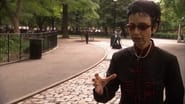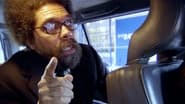gavin6942
In "Examined Life", filmmaker Astra Taylor accompanies some of today's most influential thinkers on a series of unique excursions through places and spaces that hold particular resonance for them and their ideas.As a former philosophy major (and current part-time philosopher), this documentary grabbed me by the throat and pulled me in. Philosophy is "a critical disposition of wrestling with desire in the face of death," according to Cornel West, who identifies himself as a pleasure-loving Christian. (West spends much of his time rambling about things that seem to have little connection to each other... all while being driven across town by the director.)Avital Ronell, whom I never heard of, comes across as completely bizarre. She is both full of herself, yet approachable and almost humorous. "I am very suspicious intellectually and historically of the idea of meaning," she says, saying that meaning has tended to be in the hands of the powerful. The "craving for meaning" is "devastating". Ronell is very verbose, and throws around Greek words and Heidegger casually, which will not make her welcome for most viewers (and may lead to people turning the film off early).Peter Singer, someone I admit to being a big fan of, presents his argument that there is a moral obligation for the rich to assist the poor. In the global sense, Americans should help the third world. (This is a socialist view, though Singer himself does not label it as "socialist", which is smart on his part.) He also talks of his conversion to veganism and the idea that eating meat is not justified (a concept I am sympathetic with, but not in agreement with). Those who know Singer's work will find no surprises here (and I would recommend you watch the video of Singer and Dawkins talking... that is a real mind-blower).Kwame Anthony Appiah of Princeton talks about the juxtaposition of evolution, ethics and the idea of the cosmopolitan. He presents the concept that we are very good at caring about close friends and family, but society today presents us the challenge: can we, as citizens of the world, care about others? Should we care about people who are not our blood? If not, why is blood more important? And further, is blood important in the first place? Why should I care about my own kid if I do not care about yours? These are interesting questions and perhaps not so obvious as they first appear. Elsewhere, to promote the idea of the cosmopolitan, Appiah says, "See one movie with subtitles a month." I do. Do you?Michael Hardt, whose political works are complex but fascinating, talks of his time in Central America and how he was advised to go into the mountains and wage armed revolution against Ronald Reagan! The most interesting part of his talk is the idea that many debates have been on the pointless discussion of whether human nature is inherently good or bad. I have had that pointless discussion (I picked bad). Hardt argues the whole debate is stupid because nature is changeable, and therefore constructing a theory on this static foundation is going to inevitably fail. And, you know, he is probably right...Martha Nussbaum later complained that although Examined Life displays "a keen visual imagination and a vivid sense of atmosphere and place" it nonetheless "presents a portrait of philosophy that is ... a betrayal of the tradition of philosophizing that began, in Europe, with the life of Socrates".The film has one obvious flaw: those who know little about philosophy or have little interest are going to be bored, confused or upset. I would not recommend this film to most of my friends. But, at the same time, there are a select group of friends who I would highly recommend this film to. If you like philosophy, even a little bit, rent this or watch it on the Netflix... was a great way to wind down my day and keep my brain from going mushy.
John Johnson
I really like the concept of this film: take philosophy off the page and put it back in the mouth of philosophers. Although each thinker only gets ten minutes, it is a great summary of their work. Visually it is interesting, as the director puts each philosopher in a different setting: walking in a park, rowing a boat, riding in the back of a cab, etc. (I don't understand the other reviewer who didn't like the cinematography.) Zizek, of course, was filmed amidst mounds of modern garbage.When you have to read these guys in school, you are treated the way I suppose a young Talmudic student is, who has to accept the great thought or go to hell.* But listening to them here, seeing their personality, their vulnerability and their quirks, it stimulated me greatly, and made me feel I could enter the conversation.This movie helps democratize philosophy, and I think there will be a lot more: digital cameras are so abundant and my guess is philosophers are like poets, they work for cheap. Thanks for reading.*(you can, in school, of course, challenge the ideas, but it is much much much easier to go along with the program.)
Chris Knipp
'Examined Life' introduces what may be a whole new sub-genre: the philosophical chat documentary. The title's an obvious allusion to Socrates' famous statement, 'The unexamined life is not worth living.' The film's eight philosophers are peripatetic, though Taylor doesn't claim this alludes to Aristotle, who, they say, walked around while lecturing. The philosopher of running, Dr. George Sheehan, liked to quote Thoreau: "Trust no thought arrived at sitting down." If that's true, maybe we'll have to distrust two of the speakers, because one is in a car and another is rowing a boat on a lake.It's good if you can lure the public to watch a documentary film that provides a taste of what philosophical thinking is like. Unfortunately the talkers, Cornel West, Avita Ronell, Peter Singer, Kwame Anthony Appiah, Martha Nussbaum, Michael Hardt, Judith Butler, and Savoj Zizek, aren't really making philosophy as they go along, the way Wittgenstein and G.E. Moore did, as well as their followers A.J. Ayer and Gilbert Ryle. Instead, they're just summarizing some of their main ideas or repeating riffs they've done before or answering questions from Taylor as they're being filmed walking, rowing, riding, or, in the case Zizek, fidgeting around in front of some piles of rubbish at a London dump. (Taylor previously made a film about the showy, provocative Slovenian.)While each of us asks about the meaning of life at some point or another, it's not a sure thing that philosophy is of any use, even to itself, in answering that question. Wittgenstein famously said that of what matters most to us we can say nothing. After a pungent name-dropping riff by West sitting in the back of Taylor's car, Ronell, a "deconstructionist," begins her sequence, pacing a Central Park sidewalk, with a strong dose of skepticism, not to say metaphysical and moral angst. "If you have a good conscience, then you're worthless," she opines. Disdainfully asserting that though ten minutes to speak may be fine for the others, it's ridiculous for herself, she haughtily makes a point of distinguishing between philosophy and thinking. So there's some question whether anything said by these eight people is of any use, or whether presenting them sequentially (with Cornell West injected at three points as a sort of unifying voice) makes any logical sense. But it does, because philosophers do get back to basics, and all of them are talking in one way or another about how to live.In his 'Village Voice' review of 'Examined Life' J. Hoberman falls into the inevitable trap of rating the speakers one by one. He finds Singer smug and obvious and says his "neo-Kantian platitude" about "commitment to the common good" "stops the conversation" and illustrates that distinction between philosophy and thinking. Actually Singer's stroll down Fifth Avenue while advocating vegetarianism and suggesting it's better to donate a thousand dollars to charity than to spend it on an elegant suit seemed effective and thought-provoking to me; and Singer had the best command of everyday, unpretentious language.Singer's position coheres with those of Nussbaum and Butler, both of whom speak of the need to act democratically. The image of a Bushian un-compassionate conservatism hovers behind their assertion of our collective obligation to provide for and protect those who are different, or poor, or handicapped. Nussbaum points out that everyone is "handicapped" in infancy and old age, so the need for help is universal. Butler explores a San Francisco second-hand clothing store with a wheelchair-bound friend, Sunaura Taylor, discussing accessibility and gender issues. All of this adds up to the need for a more liberal and humane society. Appiah adds another consideration: culture. As he walks through the international wing of a airport, en route to somewhere, he talks about growing up in a shack and having a Ghanan mother and English father and describes cosmopolitanism--and distinguishes it from cultural relativity. It's important to realize that people can live well (be good), he says, while following different values.One may be a cosmopolite like Appiah, but it may be better to stay at home. So you might conclude from the words of Michael Hardt, co-author of the book 'Empire.' In his youth he and others went to Latin America to engage in revolution, but they were advised to go back and make their revolution here. As he rows around the lake and runs aground looking at big turtles, he may seem ineffectual. There is the danger in this medium of peppy visuals and extended sound bites that these important thinkers and writers may wind up over-simplifying or parodying themselves.Zizek, like Jean Baudrillard, delivers provocative pronouncements that seem to defy common sense. It may simply be that while he can devastate you in the sound bites, with a kind of hit-and-run effect, he can't ever be properly understood in such small chunks. His primary point this time is that "shit" doesn't go away as we imagine, when we flush. We need to as it were "embrace" our mountains of waste, forget about living in nature, and accept being more artificial. But since he acknowledges that global warming is a real problem, why does he insist that "ecology" is the comforting new orthodoxy, like "religion" to Marx? What are we to do with this information, if it be true? And it's hard to see what to do with Cornell West's dazzling high culture jive talk about history, jazz, blues, slavery, courage, and much else. The thing about West is that, like Zizek, you may come away only with questions, but you may also, especially if you're young, come away thinking you want to be able to talk like that and think like that and have all that stuff in your head. Somewhere out of this you may get the urge to think or act in new ways. And in that sense this philosophers' sampler will have justified its existence.






